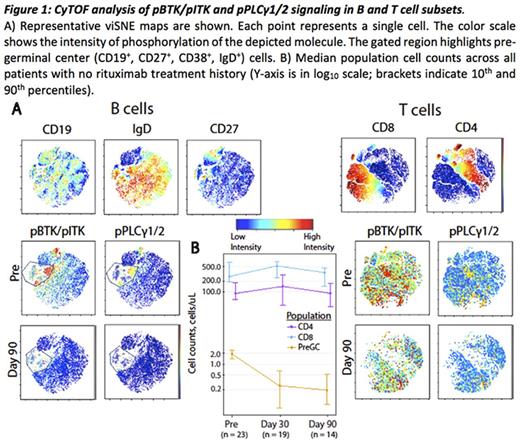Abstract
Background: Chronic graft-versus-host disease (cGVHD) is a major cause of morbidity and mortality after allogeneic hematopoietic cell transplantation (allo-HCT). Treatment relies upon corticosteroids and immunosuppressive agents with limited efficacy and considerable side-effects. Evolving research points to the complex involvement of immune T, B, and myeloid cells in the pathogenesis of cGVHD. Ibrutinib is an irreversible inhibitor of Bruton's tyrosine kinase (BTK) and interleukin-2-inducible T-cell kinase (ITK) which inhibits the activation of B-cells, specific T-cell subsets, and certain myeloid cells that are implicated in cGVHD. Substantial clinical benefit was demonstrated in an open-label phase 1b/2 study of ibrutinib in patients with cGVHD that had failed frontline therapy (Miklos et al ASH 2016). Based upon this data, ibrutinib is indicated by the US FDA for the treatment of adult patients with cGVHD after failure of one or more lines of systemic therapy.
Methods: Blood samples were collected before and multiple timepoints after starting ibrutinib 420mg daily therapy from 42 subjects with cGVHD that had failed frontline therapy (Miklos et al ASH 2016). Correlative analyses included Nanostring gene expression profiling, Luminex and ELISA based plasma testing, CyTOF phospho-immunophenotyping, and ex-vivo T-cell stimulation assays.
Results: Initial data from 8 patients using targeted, Nanostring gene expression analysis showed ibrutinib reduced inflammatory genes including NFkB-1 and chemokines CXCL10, CCL7 and CCL3 (2.6, 2.3, 25, and 1.8-fold decrease over first 3 months, respectively). Luminex plasma quantification supported gene expression profiling results, and unveiled several additional chemotactic, inflammatory, and fibrotic factors which were down modulated by ibrutinib therapy including CCL22, CXCL9, CXCL10, IL-8, sCD25, CCL4, and ST2 (69-80% of patients showed decreasing trend). 42-parameter CyTOF single cell analysis revealed a 10-fold reduction in absolute numbers of cGVHD implicated pre-germinal center B-cells (CD19+, CD27+, CD38+, IgD+), and notably diminished Tfh, Th17, and total B cells (2.6, 1.5, and 1.4-fold decrease over first 90 days, respectively) following ibrutinib therapy. Relative numbers of CD4 and CD8 T-cells, class-switched B-cells, and CD14+ monocytes remained unchanged, and iNKT, Th1, and Treg cells increased incrementally (1.8, 1.2, and 1.1-fold at day 90, respectively). IgG plasma levels persisted while IgM significantly decreased corroborating an ibrutinib germinal center effect that did not deplete long-lived plasma cells. Furthermore, T cell reactivity against influenza increased, and antibodies against EBV and tetanus remained unchanged. Strikingly, single cell phosphorylation analysis showed BTK and ITK signaling was attenuated following ibrutinib treatment in defined B and T cell subsets (Figure 1). Specifically, PLCγ1/2 activation was simultaneously diminished in the pre-germinal center and plasmablast B-cell subsets.
Conclusions: Our examination of the biologic and cellular mechanisms which support the clinical results of ibrutinib in the setting of cGVHD demonstrate that ibrutinib selectively inhibits cGVHD pathogenic pre-germinal center B-cells and Tfh cells, while preserving immune memory and Th1 T-cells. These data are especially salient given the clinical efficacy of ibrutinib in cGVHD, and the meticulous nature of the correlative studies designed to elucidate the multifactorial mechanism of action in this life-threatening disease.
Sahaf: Pharmacyclics: Research Funding; Stanford: Patents & Royalties. Tebaykin: Stanford University: Patents & Royalties. Hopper: Pharmacyclics: Employment. Cheung: Pharmacyclics: Employment; AbbVie: Equity Ownership. Bittencourt: Pharmacyclics: Employment, Research Funding; AbbVie: Equity Ownership, Research Funding. Cutler: Astellas: Consultancy; Incyte: Consultancy; Bristol-Myers Squibb: Consultancy; Kite: Consultancy; Pharmacyclics: Consultancy; Pfizer: Consultancy. Arora: Takeda Oncology: Consultancy. Waller: Cambium Medical Technologies: Equity Ownership, Membership on an entity's Board of Directors or advisory committees, Patents & Royalties; Cerus: Equity Ownership; Helocyte: Consultancy; National Institutes of Health: Research Funding; Katz Foundation: Research Funding; AMGEN: Consultancy; PRA: Consultancy; Coulter Foundation: Research Funding; Celldex: Consultancy; Chimerix: Equity Ownership; Novartis Pharmaceuticals Corporation: Consultancy, Honoraria, Research Funding. Jagasia: Janssen: Consultancy, Research Funding; Mallinckrodt: Consultancy; Therakos: Consultancy, Research Funding. Flowers: Pharmacyclics: Consultancy. Logan: Novartis: Consultancy, Research Funding; Incyte: Consultancy; Kite: Research Funding; Astellas: Research Funding; Jazz: Consultancy; Amgen: Consultancy; Pharmacyclics: Research Funding; Shire: Consultancy. Jaglowski: Pharmacyclics: Consultancy, Research Funding. Lih: AbbVie: Equity Ownership; Pharmacyclics: Employment. Solman: Pharmacyclics LLC, an AbbVie Company: Employment, Other: Travel, Accommodations, Expenses; AbbVie: Equity Ownership. Lal: Gilead Sciences: Employment; AbbVie: Equity Ownership; The Permanente Medical Group (TPMG): Employment; Pharmacyclics LLC, an AbbVie Company: Employment. Styles: Pharmacyclics LLC, an AbbVie Company: Employment; AbbVie: Equity Ownership. Hill: Amgen: Employment, Equity Ownership, Patents & Royalties; Pharmacyclics: Employment; AbbVie: Equity Ownership; Miravant Medical: Patents & Royalties. James: AbbVie: Equity Ownership; Pharmacyclics LLC, an AbbVie Company: Employment. Bendall: Fluidigm Sciences: Consultancy, Other: Travel, Accomodations, Expenses; Bluebird Bio: Other: Travel, Accomodations, Expenses, Research Funding; Ionpath, Inc.: Membership on an entity's Board of Directors or advisory committees, Patents & Royalties; Boehringer-ingelheim: Consultancy, Other: Travel, Accomodations, Expenses; Pharmacyclics: Research Funding. Dubovsky: Pharmacyclics LLC, an AbbVie Company: Employment; AbbVie: Equity Ownership.
Author notes
Asterisk with author names denotes non-ASH members.


This feature is available to Subscribers Only
Sign In or Create an Account Close Modal